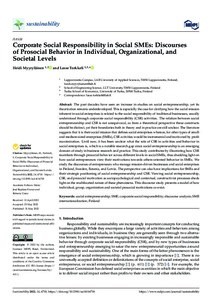Corporate Social Responsibility in Social SMEs: Discourses of Prosocial Behavior in Individual, Organizational, and Societal Levels
Myyryläinen Heidi; Torkkeli Lasse
https://urn.fi/URN:NBN:fi-fe2022081154306
Tiivistelmä
The past decades have seen an increase in studies on social entrepreneurship, yet its theorization remains underdeveloped. This is especially the case for clarifying how the social mission inherent in social enterprises is related to the social responsibility of traditional businesses, usually understood through corporate social responsibility (CSR) activities. The relation between social entrepreneurship and CSR is not unequivocal, as from a theoretical perspective these constructs should be distinct, yet their boundaries both in theory and in practice are still unclear. The literature suggests that it is their social mission that defines social enterprises whereas, for other types of smalland medium-sized enterprises (SMEs), CSR activities would be instrumental and motivated by profit maximization.
Until now, it has been unclear what the role of CSR in activities and behavior in social enterprises is, which is a notable research gap since social entrepreneurship is an emerging domain of study in business research and practice. This study contributes by illustrating how CSR manifests through prosocial behavior across different levels in social SMEs, thus shedding light on how social entrepreneurs view their motivations towards others-oriented behavior in SMEs. We study the discourses of entrepreneurs who manage mission-driven businesses and social enterprises in Finland, Sweden, Estonia, and Latvia.
The perspective can also have implications for SMEs and their strategic positioning of social entrepreneurship and CSR. Viewing social entrepreneurship, CSR, and prosocial motivation as sociopsychological and contextual, constructivist processes sheds light on the multifaceted nature of these phenomena. This discourse study presents a model of how individual, group, organization and societal prosocial motivations co-exist.
Kokoelmat
- Rinnakkaistallenteet [29335]
